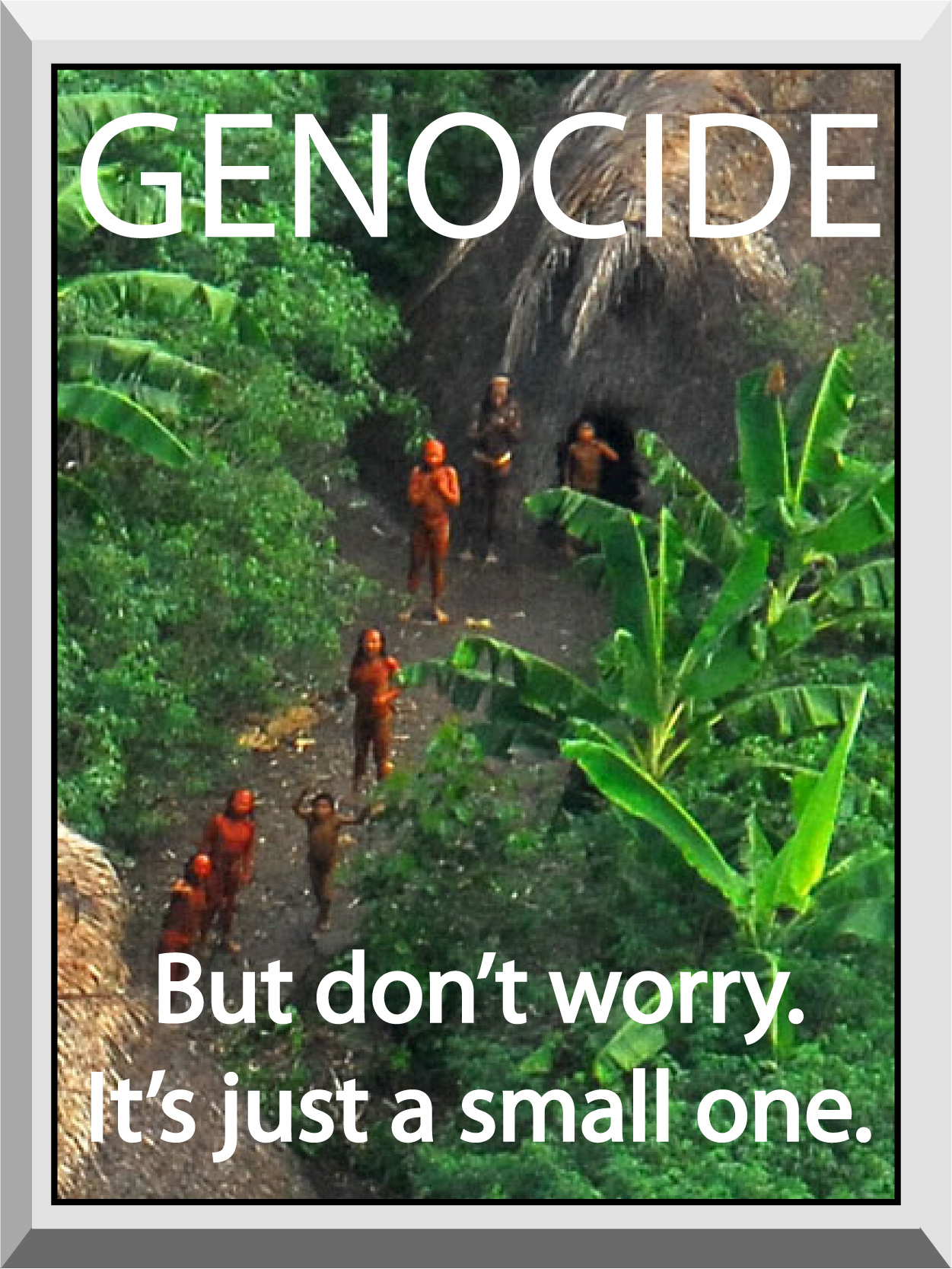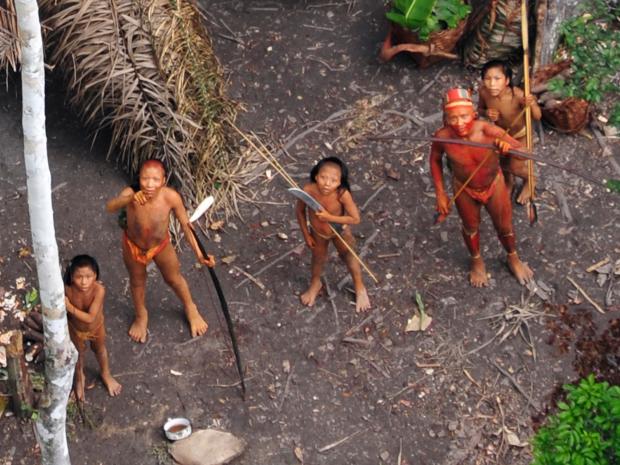
 According to GenocideWatch.org, there are 5 genocides happening right now (Syria, Sudan, Congo, Ethiopia, and Burma), 6 imminent ones, and 10 more where early warning signs of genocide are apparent. That’s enough to make anyone Furious, but who needs genocidal fury around Thanksgiving? To relieve your holiday stress, we’ll ignore these big death parties where tens or hundreds of thousands of people are erased. Instead we’ll concentrate on a tiny genocide that’s so small it’s really more like a mass murder. Unfortunately, when the entire ethnic group under attack numbers just a few hundred, it doesn’t take a huge genocide to wipe out a significant percentage of the population. Even drunken gold miners can do it, and get a laugh out of it to boot…
According to GenocideWatch.org, there are 5 genocides happening right now (Syria, Sudan, Congo, Ethiopia, and Burma), 6 imminent ones, and 10 more where early warning signs of genocide are apparent. That’s enough to make anyone Furious, but who needs genocidal fury around Thanksgiving? To relieve your holiday stress, we’ll ignore these big death parties where tens or hundreds of thousands of people are erased. Instead we’ll concentrate on a tiny genocide that’s so small it’s really more like a mass murder. Unfortunately, when the entire ethnic group under attack numbers just a few hundred, it doesn’t take a huge genocide to wipe out a significant percentage of the population. Even drunken gold miners can do it, and get a laugh out of it to boot…
 Uncontacted People Still Being Massacred in Amazonia, by Lewis Evans in CounterPunch, Nov 2017
Uncontacted People Still Being Massacred in Amazonia, by Lewis Evans in CounterPunch, Nov 2017
Ten indigenous people – including women and children – were murdered in the Javari Valley region of the Amazon in September this year, according to reports. Their bodies were alleged to have been mutilated and dumped in a river. The attack was believed to have been carried out by gold miners, two of whom were later recorded bragging about it in a local bar.
This is not the story of some conquistadors or rubber tappers in the colonial era. This happened in 2017 – just weeks ago – in the present-day Republic of Brazil. Despite all of the apparent “progress” that humanity has made over the past few centuries, whole populations of indigenous peoples are still being systematically annihilated by land invaders and colonists.
Extremely vulnerable
Outside indigenous rights circles, many people are still amazed at the very existence of uncontacted tribes. The popular assumption is that that era is over: the entire world has been colonized and brought over into the industrialized mainstream.
But as extraordinary aerial photos released by Survival International in 2008 and again in 2011 revealed, this simply isn’t the case. There are people, in the Amazon and elsewhere, who choose to reject contact with the mainstream.
They are not backward and primitive relics of a remote past. They are our contemporaries and a vitally important part of humankind’s diversity.
Uncontacted tribes are living self-sufficient and diverse ways of life, hunting, foraging, growing food in gardens and holding on to their own languages, mythologies, and perspectives on the world. They have every right to carry on doing so, and we in the outside world have a deep responsibility to ensure that they are able to.
Of course, not everyone shares this view. There have always been people willing to forcibly contact isolated tribes. Whether it’s evangelical missionaries determined to impose their theology, or opportunist land grabbers looking to make a quick buck, there is a long and bloody history of genocidal violence against tribal people.
 Uncontacted tribes are extremely vulnerable not only to violence from outsiders who want to steal their land and resources, but also to diseases like flu and measles to which they have no resistance. It makes uncontacted tribes the most vulnerable peoples on the planet.
Uncontacted tribes are extremely vulnerable not only to violence from outsiders who want to steal their land and resources, but also to diseases like flu and measles to which they have no resistance. It makes uncontacted tribes the most vulnerable peoples on the planet.
Agribusiness lobby
Recently contacted people still suffer from serious infections, which can wipe entire peoples out. The Ayoreo in Paraguay are still battling a mysterious TB-like illness which was introduced by ranchers in the 1990s.
As shocking as it is, violence like that allegedly inflicted on the Indians last month is not unprecedented. It probably isn’t even that uncommon.
Survival has been warning for years of “hidden genocides” taking places in the depths of the Amazon. Evidence of this often emerges long after the fact. Here at least, we were able to see clearly the horror that many uncontacted people face, and the fate that could face many other tribes without robust protection of their lands.
All uncontacted tribal peoples face catastrophe unless their land is protected. Without this, many risk going the way of the Akuntsu, a small Amazonian tribe now reduced to just four members after brutal violence by ranchers in the 1980s.
Dismayingly, the current Brazilian government is unwilling to provide such protection. President Michel Temer and his administration are very closely tied to the country’s all-powerful agribusiness lobby – the big landowners who dominate the country’s lucrative agricultural industries. The government has made extensive cuts to FUNAI, the government agency responsible for protecting indigenous lands.
Deep forests
Brazilian politicians have not done nearly enough to prevent massacres like that which reportedly took place last month. As far as they are concerned, it seems, indigenous people and their right to their land are at best a nuisance, at worst a roadblock to profit that needs to be forcibly removed.
This flies in the face of Brazil’s constitution and international law. It’s also fundamentally immoral – allowing the genocide of entire peoples and the carving up of the Amazon for the enrichment of a few vested interests.
But there is some hope. Where uncontacted peoples’ land rights are respected, they continue to thrive. We know there are more than a hundred such tribes around the world, for example, and since the flurry of attention they’ve received over the last nine years, a swelling global movement calling for their land rights has emerged.
Bringing together indigenous organizations, environmental and human rights activists, A-list actors like Gillian Anderson and Sir Mark Rylance, and energetic members of the public around the world, more and more people are raising their voices and pressing governments to act for uncontacted tribes.
And the pressure has told. In April 2016, the Brazilian minister of justice was pressurized into signing a decree to demarcate land for the highly vulnerable Kawahiva tribe, who are living on the run in the deep forests of Matto Grosso state.
Contemporary societies
It’s in all our interest to prevent the annihilation of uncontacted tribes. Their knowledge is irreplaceable and has been developed over thousands of years. They are the best guardians of their environment, and evidence proves that tribal territories are the best barrier to deforestation.
Survival International is doing everything it can to secure uncontacted tribes’ land for them, and to give them the chance to determine their own futures. It’s a fight we’ve been leading since 1969.
Tragedies like that which reportedly took place in the Amazon are certainly demoralising, and it is shattering to have to hear about incidents we were unable to prevent. But we won’t give up until we have a world where tribal peoples are respected as contemporary societies and their human rights protected.
Digging Deeper
Brazilian Gold Miners Bragged About Killing Members of an ‘Uncontacted’ Tribe, by Katie Reilly in Time Magazine, Sep 2017
Authorities: Gold miners at a bar bragged about slaughtering members of a reclusive Brazilian tribe, by Cleve Wootson Jr. in the Washington Post, Sep 2017
Were the gold miners who had ‘killed and chopped’ uncontacted Amazon tribe in Brazil innocent? By Carrie Gaard on Lavozdelmuro
Illegal miners’ boast of ‘massacring’ entire uncontacted Amazon tribe, by Staff writers at News Corp Australia Network, Sep 2017
Akuntsu– Full Documentary, Dec 2014
Brazilian police investigate gold miners for ‘killing uncontacted Amazon tribe members’ by Harriet Agerholm in The Independent, Sep 2017
‘Uncontacted’ Amazon Tribe Members Reported Killed in Brazil by Shasta Darlington in the NY Times, Sep 2017
Death in Javari by Bruce Parry on BBC,
Uncontacted Amazon Tribe: The Cabellos Largos by Dan James Pantone on Amazon-Indians.org
Note on the alleged massacre of isolated Indians in the Javari Valley, Fundacao Nacional do Indio, Sep 2017
How To Help
The Matses Movement The Genocide Education Project
Survival International Genocide Watch










